7-7. After '6 days of sleep'
('sleeping mats') there would come, according to the E text, day number
208 + 6 =
214.
... For six days (po ono), mats (moenga)
were taken on board the canoe (i.e., the loading of the
canoe took six days) ... [E:74]
Another way to express this idea could be to connect it with
the 'butterfly' of Orion and the phase of fundamental transformation
when nothing moves (the 'cocoon'):
... The Taoist philosopher Zhuangzi once had
a dream of being a butterfly flying without care about humanity,
however when he woke up and realized it was just a dream, he
thought to himself 'Was I before a man who dreamt about being a
butterfly, or am I now a butterfly who dreams about being a
man?' In some old cultures, butterflies also symbolize rebirth
into a new life after being inside a cocoon for a period of time
...
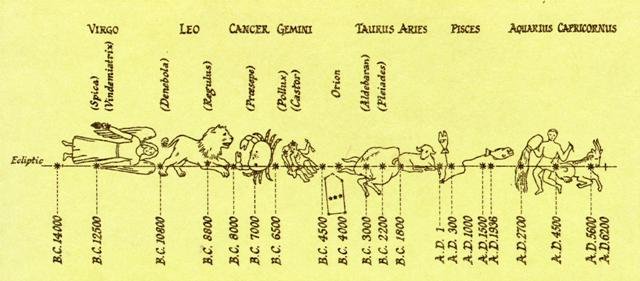
|
June 9 (2 *
80) |
10 (161) |
11 |
12 |
13 |
14 (*85) |
|
... Midsummer is the flowering season of the oak,
which is the tree of endurance and triumph, and like
the ash is said to 'court the lightning flash'. Its
roots are believed to extend as deep underground as
its branches rise in the air - Virgil mentions this
- which makes it emblematic of a god whose law runs
both in Heaven and in the Underworld ... The month,
which takes its name from Juppiter the oak-god,
begins on June 10th and ends of July 7th. Midway
comes St. John's Day, June 24th, the day on which
the oak-king was sacrificially burned alive. The
Celtic year was divided into two halves with the
second half beginning in July, apparently after a
seven-day wake, or funeral feast, in the oak-king's
honour ...
.jpg) |
 |
 |
 |
 |
 |
 |
|
Ea6-30 (2 * 104) |
Ea6-31 |
Ea6-32 |
Ea6-33 |
Ea6-34 |
Ea6-35 |
|
manu kake rua |
marama 2 |
tagata uru - vai |
hokohuki - kiore |
hokohuki - kiore |
|
Kake. Kakea, to come near, to embark. P Pau.:
kake, to climb, to ascend. Mgv.: kake,
the arrival of shoals of spawning fish. Mq.: kake,
to climb up a valley. Ta.: ae, to climb, to
ascend. Churchill. Mgv.: kake, to strike on
an ocean reef. Ta.: ae, to strand. Churchill.
Sa.: a'e, upward, to go up; sa'e, to
elevate one leg, as in the act of falling in a club
match; 'a'e, to ascend, to rise. To.: hake,
upward, to ascend. Fu.: ake, up, to ascend;
sake, ro raise the leg at one in derision or
mockery; kake, to climb, to ascend. Niuē:
hake, up, going up. Uvea: ake, up;
kake, to go up. Ma.: ake, upward; kake,
to climb, to ascend. Mq.: ake, on high,
upward; kake, to ascend. Mgv.: ake,
upward. Bukabuka: ake, up. Ta.: ae,
up, to go up, to ascend, to climb. Ha.: ae,
to raise, to lift up, to mount. Fotuna:
no-jikijiake, to lift up; no-tukake, to
stand upright. Nukuoro: kake, to go up.
Nuguria: kake, up; hanage, northwest.
Rapanui: kake a, to go abroad. Vi.: thake,
upward; thaketa, to dig or lift up. Churchill
2. |
|
REVERSED
NAKSHATRA → CLOSE TO THE FULL MOON: |
|
Dec 8 |
9 |
10 |
11 (*265) |
12 |
13 |
|
"Oct 28 |
29 |
30 |
31 |
"Nov 1 (*225) |
2 (306) |
|
ξ Ophiuchi (262.2),
θ Ophiuchi, ν Serpentis, ζ, ι Apodis (262.4),
ι Arae (262.8), ρ Herculis (262.9)
*221.0 = *262.4 - *41.4 |
β, γ Arae (263.3), κ Arae (263.5), σ Ophiuchi
(263.6) |
LESATH (Sting) =
υ Scorpii,
δ
Arae (264.7),
CHOO (Club) =
α
Arae
(264.9) |
Al Shaula-17
ALWAID (Mother Camels) =
β
Draconis, MAASYM (Wrist) =
λ
Herculis
(265.1),
SHAULA (Sting) =
λ
Scorpii
(265.3),
KUMA =
ν
Draconis
(265.6),
σ
Arae (265.9)
HAMAL (α ARIETIS) |
RAS ALHAGUE (Head of the Serpent Charmer) = α
Ophiuchi
(266.1),
SARGAS = θ Scorpii (266.3),
μ Ophiuchi, π Arae (266.5),
NAN HAE (Southern Sea) = ξ Serpentis
(266.6), AL
DHĪLI (The Wolf) = ω Draconis,
ι Herculis (266.7) |
λ
Arae (267.1),
GIRTAB (Seizer) =
κ
Scorpii,
ο
Serpentis (267.6),
DSIBAN (Wolf Pair) =
ψ
Draconis
(267.9)
|
|
OCT 5 |
6 |
7 (*200 = *264
- 64) |
8 |
9 |
10 |
|
INVISIBLY
CLOSE TO THE SUN: |
.jpg)
The 3 great pyramids on the Giza plateau have been
built on the western bank of the Nile (→
the Milky Way), for in the west was the place for
descending down into the Underworld, and thus the proper
direction for burial sites.
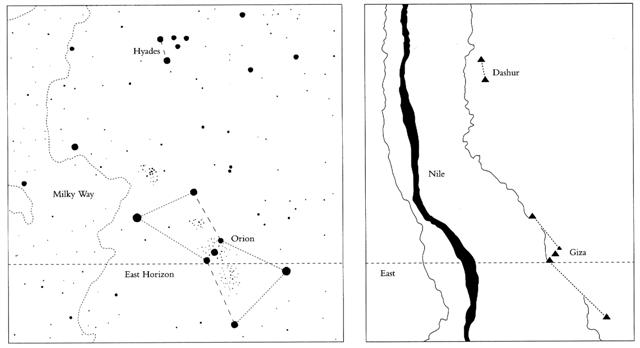
... Men's spirits were thought to
dwell in the Milky Way between
incarnations.
This conception has been handed down as an Orphic
and Pythagorean tradition fitting into the frame of
the migration of the soul. Macrobius, who has
provided the broadest report on the matter, has it
that souls ascend by way of Capricorn, and then, in
order to be reborn, descend again through the 'Gate
of Cancer'. Macrobius talks of signs; the
constellations rising at the solstices in his time
(and still in ours) were Gemini and Sagittarius: the
'Gate of Cancer' means Gemini ... |
|
Shur-narkabti-sha-iltanu-5 (Star in the Bull towards
the north)
σ
Aurigae (80.4), BELLATRIX (Female Warrior) =
γ
Orionis, SAIF AL JABBAR (Sword of the Giant) =
η
Orionis
(80.7),
ELNATH (The Butting One) =
β
Tauri =
γ Aurigae
(80.9) |
ψ
Orionis (81.1),
NIHAL (Thirst-slaking Camels) = β Leporis
(81.7) |
KHUFU
MINTAKA (Belt) = δ
Orionis, υ Orionis (82.4),
χ Aurigae (82.5), ε Columbae (82.6)
*41.0 = *82.4 - *41.4
→ 41 Arietis (Bharani) |
KHAFRE
Al Hak'ah-3 (Brand)
/
Mrigashīrsha-5 (Stag's Head)
/
Turtle Head-20 (Monkey)
/
Mas-tab-ba-tur-tur (Little Twins)
ARNEB =
α
Leporis, CRAB NEBULA = M1 Tauri
(83.0,
φ¹
Orionis (83.1),
HEKA =
λ
Orionis, ORION NEBULA = M42
(83.2),
φ²
Orionis (83.6),
ALNILAM (String of Pearls) =
ε
Orionis
(83.7) |
MENKAURE
Three Stars-21 (Gibbon)
/
Shur-narkabti-sha-shūtū-6 (Star in the Bull towards
the south)
/
ANA-IVA-9
(Pillar of exit)
HEAVENLY GATE =
ζ
Tauri,
ν
Columbae (84.0),
ω
Orionis (84.2),
ALNITAK
(Girdle) =
ζ
Orionis,
PHAKT (Phaet) =
α
Columbae
(84.7) |
ο Aurigae (85.8), γ Leporis (85.9)
YANG MUN (α Lupi) |

... The dominating constellation [in winter] is
Orion whose stars form a recognizable rectangle with
the middle occupied by three bright stars in a row.
The whole group is reminiscent of a butterfly with
wings extended ... |
If they had looked at the face of the Moon they could have used
the Julian equinox (day 84) rather than the Gregorian
equinox (day 80). The Heavenly Gate (→ Menkaure) was the Star in
the Bull towards the South and it came 4 days after the Star in
the Bull towards the North (The Butting One):
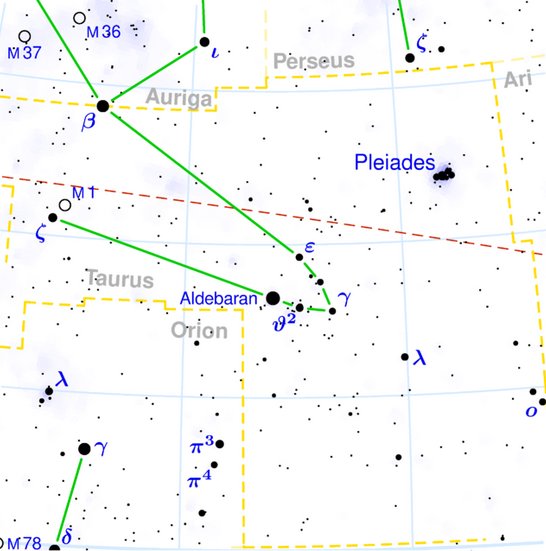
... Menkaure was allegedly a much
more benevolent Pharaoh than his predecessors. According to
legends related by Herodotus, he wrote the following: This
Prince (Mycerinus) disapproved of the conduct of his
father, reopened the temples and allowed the people, who
were ground down to the lowest point of misery, to return to
their occupations and to resume the practice of sacrifice.
His justice in the decision of causes was beyond that of all
the former kings. The Egyptians praise him in this respect
more highly than any other monarchs, declaring that he not
only gave his judgements with fairness, but also, when
anyone was dissatisfied with his sentence, made compensation
to him out of his own purse and thus pacified his anger. The
Gods however ordained that Egypt should suffer tyrannical
rulers for a hundred and fifty years according to this
legend. Herodotus goes on: An oracle reached him from the
town of Buto, which said 'six years only shalt thou
live upon this earth, and in the seventh thou shalt end thy
days'. Mycerinus, indignant, sent an angry message to
the oracle, reproaching the god with his injustice - 'My
father and uncle,' he said 'though they shut up the temples,
took no thought of the gods and destroyed multitudes of men,
nevertheless enjoyed a long life; I, who am pious, am to die
soon!' There came in reply a second message from the oracle
- 'for this very reason is thy life brought so quickly to a
close - thou hast not done as it behoved thee. Egypt was
fated to suffer affliction one hundred and fifty years - the
two kings who preceded thee upon the throne understood this
- thou hast not understood it'. Mycerinus, when this
answer reached him, perceiving that his doom was fixed, had
lamps prepared, which he lighted every day at eventime, and
feasted and enjoyed himself unceasingly both day and night,
moving about in the marsh-country and the woods, and
visiting all the places he heard were agreeable sojourns.
His wish was to prove the oracle false, by turning night
into days and so living twelve years in the space of six
...
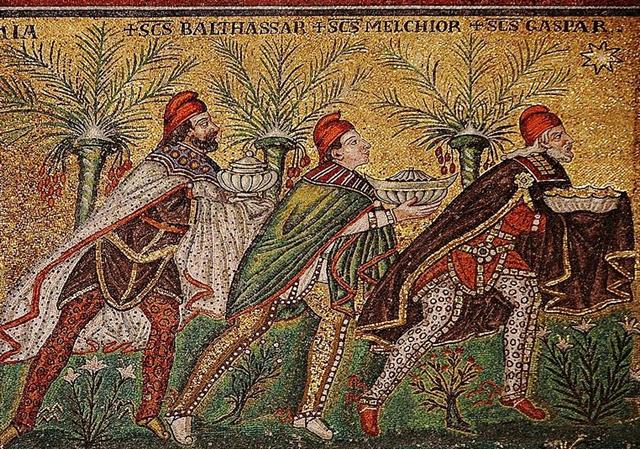
|
June 15 (2 * 83) |
16 |
17 (2 * 108 - 2 *
24) |
18 (*89) |
 |
 |
 |
 |
|
Ea6-36 (2 * 107) |
Ea6-37 |
Ea6-38 (216) |
Ea6-39 |
|
tagata hakareva |
ka reva te ika |
e atu te ika |
ko te ika |
|
Reva.
To hang
down; flag, banner. Revareva, 1. To be
hanging vertically; to detach oneself from the
background of the landscape, such a person standing
on top of a hill: ku-revareva-á te tagata i ruga
i te maúga. 2. To cast itself, to project itself
(of shadows); revareva-á te kohu o te miro i te
maeha o te mahina, the shadow of the tree casts
itself in the light of the moon. 3. Uvula. Vanaga.
To hang, to suspend, flag, banner; hakareva,
to hang up; hakarereva, to hang up, to
balance; hakarevareva, to wave. T Pau.:
reva, a flag; fakarevareva, to hang up,
to suspend. Mgv.: reva, a flag, a signal.
Mq.: éva, to hang up, to be suspended, to
wave a signal. Ta.: reva, a flag, banner;
revareva, to wave. The germ sense is that of
being suspended ... any light object hung up in the
island air under the steady tradewind will flutter;
therefore the specification involved in the wave
sense is no more than normal observation. Churchill.
Mgv.: 1. A plant. Ta.: reva, id. Mq.: eva,
id. Sa.: leva, id. Ma.: rewa-rewa, id.
2. To cross, to pass across quickly; revaga,
departure. Ta.: reva, to go away, to depart.
Ma.: reva, to get under way. Churchill. Ta.:
The firmanent, atmosphere. Ha.: lewa, the
upper regions of the air, atmosphere, the visible
heavens. Churchill.
Atu.
Particle of meaning opposite to that of mai;
it refers to the second or third person, expressing
movement away: ka-avai-atu, give it to him:
he-oho-atu au, I am going there, after you;
i-oho-atu-era, when I had gone there. Vanaga.
1. a. Directive, of motion from the speaker. b.
Somewhat expressive of the comparative degree. 2.
Pupil; hakaatu, proof; hare hakaatuga,
schoolhouse, class. 3. (hakaatu), to presage.
4. (hakaatu), mark, object. Churchill.
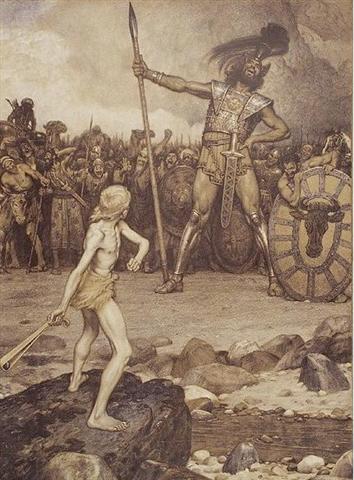

 |
64 |
 |
|
Ea5-16 (152)
|
Ea6-39
(217) |
|
AL-SEIPH (The Scimitar) (*24.5) |
ξ Columbae (*88.5) |
|
|
REVERSED
NAKSHATRA → CLOSE TO THE FULL MOON: |
|
Dec 14 (Lucia) |
15 |
16 (350) |
17 (*271) |
|
"Nov 3 |
4 |
5 (*229) |
6 (310) |
|
KELB ALRAI (Dog of the Shepherd) =
β
Ophiuchi,
μ Arae (268.1),
KEW HO (Nine Rivers) =
μ
Herculis
(268.6),
η
Pavonis (268.7),
APOLLYON =
ι
Scorpii
(268.9) |
MULIPHEN (Oaths) =
γ
Ophiuchi
(269.0),
BASANISMUS = G Scorpii
(269.5),
PHERKARD (Dim One of the Two Calves) =
δ
Ursae Minoris
(269.9) |
PTOLEMY CLUSTER = M7 Scorpii
(270.5),
GRUMIUM (Lower Jaw) =
ξ Draconis
(270.9) |
RUKBALGETHI GENUBI (Bending Claw) =
θ
Herculis
(271.1),
ξ
Herculis (271.5),
ETAMIN (Head) =
γ
Draconis,
ν
Herculis (271.7),
ν
Ophiuchi (271.8) |
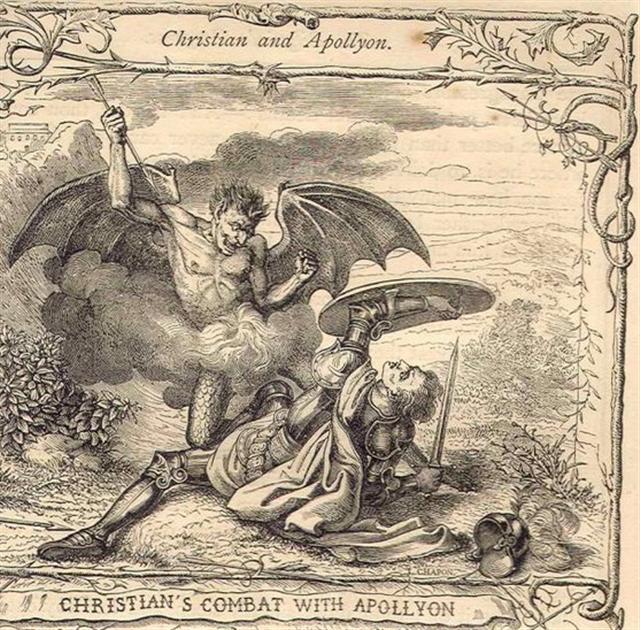 |
|
OCT 11 |
12 |
13 |
14 (*207) |
|
INVISIBLY
CLOSE TO THE SUN: |
|
μ
Columbae (86.1),
SAIPH (Sword) =
κ Orionis
(86.5),
τ
Aurigae,
ζ
Leporis (86.6) |
υ
Aurigae (87.1),
ν
Aurigae (87.2),
WEZN (Weight) =
β
Columbae,
δ
Leporis (87.7),
TZE (Son) =
λ
Columbae
(87.9) |
Ardra-6 (The Moist One)
/
ANA-VARU-8 (Pillar to sit by)
χ¹
Orionis,
ξ
Aurigae (88.1),
BETELGEUZE
=
α
Orionis
(88.3),
ξ
Columbae (88.5),
σ
Columbae (88.7)
ZUBEN ELGENUBI (α Librae) |
η
Leporis (89.0),
PRAJA-PĀTI (Lord of Created Beings) =
δ
Aurigae,
MENKALINAN (Shoulder of the Rein-holder) =
β
Aurigae, MAHASHIM (Wrist) =
θ
Aurigae,
and
γ
Columbae (89.3),
π
Aurigae (89.4),
η
Columbae (89.7)
*48.0 = *89.4 - *41.4 |
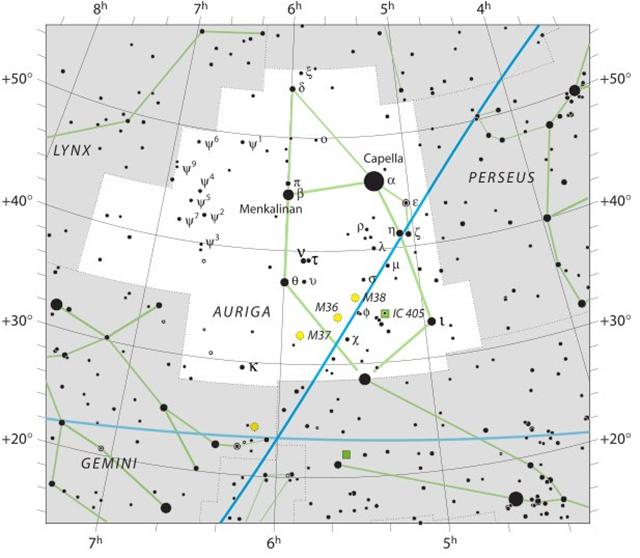 |
After the Pillar of Exit
(α Columbae), the 9th Tahitian star pillar (ana),
came the Pillar to Sit By, the 8th pillar
(Betelgeuze). Anciently they seem to have counted down
according to the
nights of the Moon.
|
Pillar of Exit
(→ †) |
*4 |
Pillar to Sit
By (→ *) |
 |
*62 |
 |
 |
 |
|
Ea5-16 (152)
|
Ea6-37 |
Ea6-38 (216) |
Ea6-39 |
|
AL-SEIPH (The Scimitar) (*24.5) |
μ Columbae |
λ
Columbae |
ξ Columbae (*88.5) |
 |
And some saw a
bird-snare
at Orion, i.e. a place where the bird was forced to
sit still:
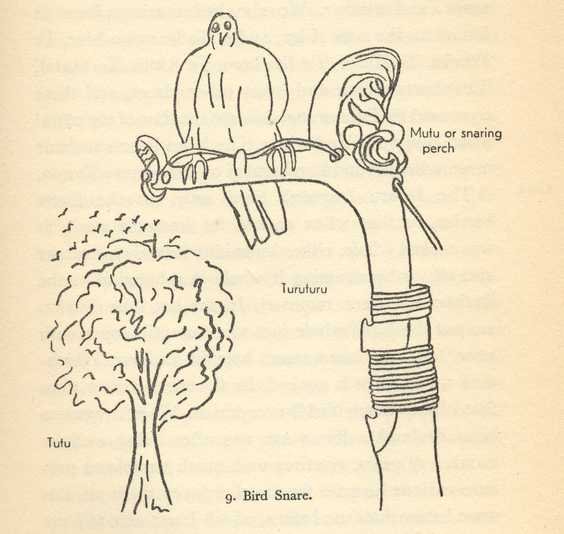
Tutu.
1. Circle of fishing
nets arranged in the shape of a funnels or baskets.
2. To light a fire; he-tutu i te ahi: to burn
something. 3. To hit, to strike, to beat. Tûtú,
to shake (something) clean of dust or dirt;
he-tûtú te oone o te nua, to shake the dirt off
a nua cape. Tutuhi, to reject the
responsibility for a mistake onto one another, to
blame one another for a mistake (see tuhi).
Tutuki, to stumble, to trip. O tutuki te
va'e, in order not to trip. Tutuma,
firebrand, partly burnt stick. Tuturi, to
kneel. Vanaga. 1. To beat bark for cloth. PS Pau.,
Mgv., Mq., Ta.: tutu, id. Sa., To., Fu.:
tutu, id. 2. A broom, to sweep, to clean. Mq.:
tutu, to beat out the dust. 3. To shake, to
winnow. Mgv.: tutu, to tremble, to leap. Mq.:
tutu, to shake. 4. To kindle, to light, to
ignite, to set fire, to burn. Mq.: tutu, to
burn, to set fire. 5. To stand; hakatutu, to
set joists. P Mgv., Mq.: tutu, to stand
upright. Ta.: tu, id. Tutua (tutu
1): board on which bark is beaten into cloth. PS
Mgv.: tutua, a cloth beater. Mq., Ta.:
tutua, wood on which cloth is beaten. Sa., Fu.:
tutua, id. Tutui: tutui ohio,
chain, tutui kura, shawl. Mq.: tuitui kioé,
chain. Tutuki: shock, contusion, to run
against, to collide; tukukia, to run foul of.
P Pau.: tukituki, to strike, to pound, to
grind. Mgv.: tukia, to strike against, shock,
concussion. Mq.: tutuki, id. Ta.: tui,
id. Tutuma: 1. (tutu - ma) a
live coal. 2. Tree trunk T
(? tumu).
Tutumata, ligament of the eye, orbit, eyelid. T
(tutumate, eyelid G). Tutuu,
bristling. Churchill.
|
Rigel |
Puanga |
Blossom
Cluster |
|
Belt and
Sword |
Te Mutu
Te Teke |
The
Perch |
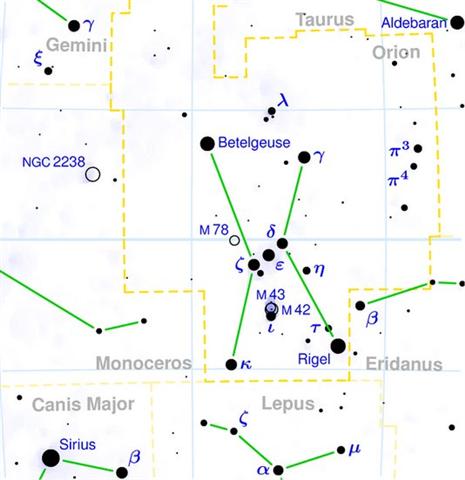
Mutu.
1. Cut short,
shortened, amputated; at an end, ceased; anything
cut off short; short, brief, quick (rare).
Ua muku ko'u lole, my dress is shortened.
He kanaka wāwae muku, a person with
amputated foot. Huli muku a'ela nā wa'a,
the canoes turned sharply. (PPN mutu.) 2. A
measure of length from fingertips of one hand to the
elbow of the other arm, when both arms are extended
to the side. 3. Broken section of a wave or crest.
See lala 1. 4. Same as Mumuku, a
wind. 5. Thirtieth night of the moon, when it has
entirely disappeared (muku). 6. Starboard
ends of 'iako (outrigger booms), hence
starboard sides of a canoe. Wehewehe.
Teke.
Occiput. Teketeke,
short (not tall); also: teke. Vanaga. Teke
ki nei, as far as, until (? tehe 1).
Teketeke, crest, ridge. Churchill.
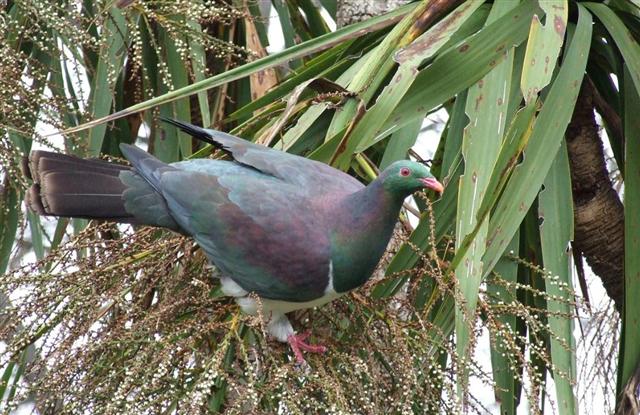
|

.jpg)





.jpg)












